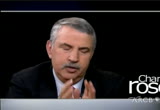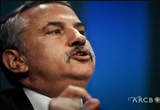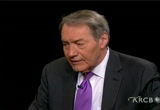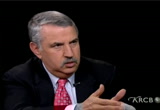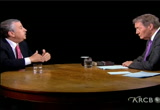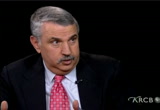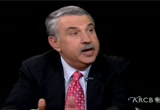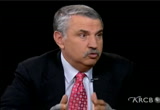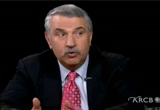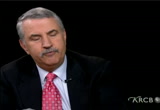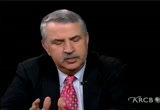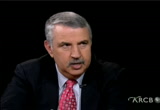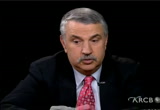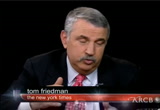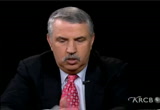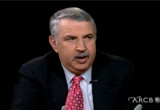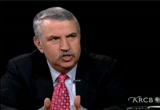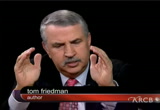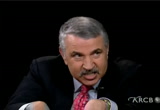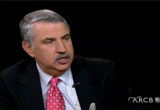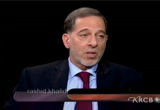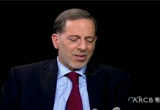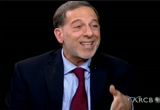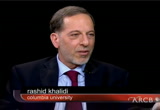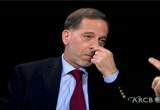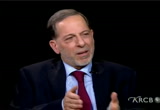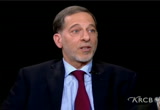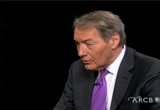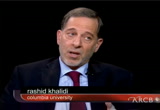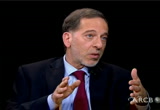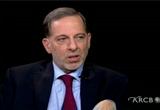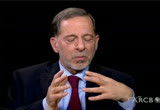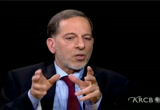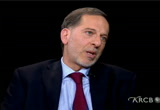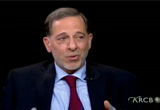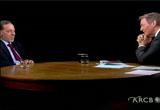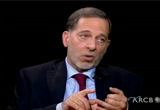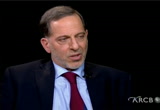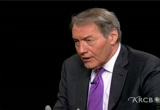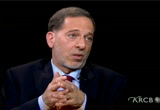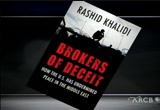tv Charlie Rose PBS April 4, 2013 11:00pm-12:00am PDT
11:00 pm
>> rose: welcome to the program. tonight, all about the middle east. we begin with tom friedman of the "new york times." >> the minute we step, there's such a nurse al ject sensitivity. we have to do it quietly but here's what we have to do loudly. stand up for the rules of the game. constitutionism rotation and finances in power. that's one thing we have to do. and the other thing we have to do is tell the opposition you've got to run. boycotting elections is the worst thing you can do. >> rose: we conclude with
11:01 pm
rashid khalidi from columbia university. >> the president, i say this, i hadn't read the species carefully. i knew him in the day when he was a state senator but the time after he became a national politician i would read the headlines or before what he said, i sat down and read these speeches. they adopt an almost israeli narrative in the entire history of conflict. this speech in israel did th again. you have to read it carefully to realize he's hitting every stop. >> rose: he's head -- >> that's not the way to resolve it. you're not going to resolve it. >> rose: friedman and khalidi when we continue.
11:02 pm
captioning sponsored by rose communications from our studios in new york city, this is charlie rose. >> rose: tom friedman is here. he is a columnist for the "new york times." he's a three-time pulitzer prize winner and the author from beirut to jerusalem first published in 1989, documented his time as a reporter in
11:03 pm
lebanon israel. recently been updated to reflect the changes in the region caused by the arab awake things. he writes i invite you to read this book to understand the identities, aspirations and passions that endure in the middle east and explore the old forces interacting with the new forces. i'm pleased to have tom friedman back at this table. >> pleasessed to be here charlie, thank you. >> rose: way back when i did an interview with you. also today when i know a friend of mine from wherever they come say i'm going to beirut say start with this. this is one of the things you ought to go and now it's been updated. you updated it because you wanted to reflect from a foundation the ideas that has been expressed there and how they are interacting with new ideas. >> you know charlie for probably almost 20 years my publisher jonathan used to say to me you
11:04 pm
should update the book. we did it once after oslo and i said i will update but it will be new forward beirut to uses level, one pag one line. nothing has changed. but in the wake of the arab spring somebody very big has changed. there's been a tendency i think in analyzing the arab spring to say it's over it's finished a disaster, i told you so but i told you so. i told you so. and my attitude is i don't need to be the first on my block to announce that, you know, this is a finished, over, etcetera. it's if i would say a disastrous is space right now. there's no about it. it's been a bad inning and we can tal about that but i think this is the beginning of a long process. what i tried to do in the addition of the book is really frame what are the forces at work right now. >> rose: the first inning, we'll talk about that. but what's the end? where is it headed toward?
11:05 pm
>> so the framework i use in the update, charlie, comes from our mutual friend one of my real teachers doug sideman. doug likes to fall back on isaiah notion of positive and negative freedom. freedom from and freedom to. so what we've seen in the arab awakening is is freedom from administrates. they got their freedom from these different autocratic regimes. that's the first half. but now they're in the freedom two phrase. freedom to do what? freedom to go where, freedom to be whom. what you see playing out from tunisia to libya to ayeman. some want to be free to be citizens with rights and responsibilities equal to everybody else. i would argue every one of these revolutions started by people with that impulse. you got another track of people want to be free to be more
11:06 pm
sectarian, to be more sunni or shia. and you have people who want to be more faithful to the sharea. what you see playing out is all three ofhough forces contending. now what we know from ho this played out was the people who are most ready for this revolution most organized underground, were the muslim brotherhood parties in tunisia. >> rose: they didn't start it. >> no, they didn't start it but they were most ready to take advantage of it. but if i were to step back today charlie, and if you said what strikes you about this moment what strikes me now two years into this is how incompetent these muslim brotherhood parties are, given the fact of how presented they supposedly were 50 years planning for this
11:07 pm
moment he have to say how sued it is, how disorganized plightly the opposition forces. they started this but couldn't capture and fielding political parties. >> rose: the interesting thing to me and you can correct this, the people who started weren't politicians. >> no. >> rose: they'd no idea about governance. they wanted to make a statement about dignity and freedom but not the government. >> i'm just going to say that one of the most memories that i have is you and i sitting in a tv tower, are you know the night mubarak was toppled, i remember the joy, i remember the high expectations. but politic is a hard thing. i want to say something in their defense. 50 years these regimes smashed anyone who actually tried to
11:08 pm
build an authentic legitimate independents secular progressive party that should work. mubarak actually put in jail the guy who ran against him in that election. so on the one happened these people had no chance to get that experience. he smashed the ngos that were trying to give people electioneering experience. >> rose: same thing happened in iran. >> exactly. so it is no wonder we've got this political vacuum. and you know, what i think the most we could hope for is that it's a little bit what you see in russia toy, charlie, which is that certainly no fan of putin. when i think of russia today, if you think about it, if we could get -- what is the real agent of change in russia and the middle east. it's something that takes nine months and 20 years. a new generation. we need a new generation grows up thinking what they wanted writing what they want, read
11:09 pm
what they want. that's all the old generation interviewed in russia and middle east are. my hope for russia is the bear minimum. give me the stability for nine months and 21 years. it's going to be corrupt, putin will arrest them. his crohnies. that generation will grow up writing what it wants and then you have hope for change. my hope for these countries now is that it's the league minimum. give me the league minimum of basic stability so that young generation can grow up flower and eventually take the reig from these wounded souls basically who are the immediate transition figures. >> rose: there was a hope some of the islamist parties would come to power and power would be a teaching moment for them. they say oh my god have i to pay
11:10 pm
the streets and schools and hospitals and street lines and sanitation and that would be a learning experience so that whatever old ideas that were anti-democratic would go away. >> these were mushrooms that were grown in the dark for 50 years. they could talk economics and globalization but they didn't experience it. that's why they didn't start the revolution. they were not really connected with their youth. and so the arab spring has been, it surprised me at their incompetence. it surprised me and saddened me but not unexpectedly at how difficult the more progressive forces had forming parties and the most tragic is the hardest on women. the unleashing of rape as a tool of the regime and the police.
11:11 pm
we've seen this in tahrir square. we've got a number of sexually repressed young men can't get a job, can't get apartments and can't get married and brutalizing and harassing and raping women. in the context of these demonstrations i think has been one of the real tragedies of this. and ironically women have probably done better in the last two years in places like kuwait, saudi arabia, united emirates, in the gulf where they have loose upped up because they don't want a revolution. >> rose: and that's putting policy -- >> ironically there's probably been more progress there than in the countries where women already in cabinets and whatnot. very few women in the tunisia islamist cabinet. the arab spring for the moment number one has been a set back i think for arab and muslim women. >> rose: when y loo at saudi arabia, do you look at
11:12 pm
bahrain and you look at jordan will it spread there and if so will they watch and say as they do in jordan we're going to move to a monarchy as they do in saudi arabia we're going to allow a form here that we can manage. >> i don't buy, myself charlie, i just think the cat's out of the bag. even when you look, saudi araba is the highest twitter use on the planet certainly per capita. the people are being empowered, more directly by them and tunisia and the gulf but women and it's only a matter of time they're going to have to change. here's what's scary, though. it's sometimes hard for us to see this and admit, but if you empower the people in saudi arabia or in uae or qatar or to wait, the people are a heck of a lot of more conservative than the leaders. the truth is --
11:13 pm
>> rose: conservative in what way? >> religious and politically conservative. you'll see that the trend there really come to the surface. the saudi family. this is a hard thing for me to say but in the context of saudi arabia is a liberalizing force compared to if the lid came off there. if the lid came off there, thomas jefferson is not waiting there. >> rose: it's a percentage of the volt. >> it's 19% of the vote. islam trend, 25-30%. muslim brotherhood -- >> rose: what are we defining as islamists, follow islam or the muslim brothers. >> political islam that wants to vote for muslim political parties. let's say about a third. do you know with what's confusing when we use these terms charlie the others are not
11:14 pm
secular in the western sense. egypt is a traditional society. people are very much attached to their religion. they might not wear it in the political path, they might not want sharia law, okay. so secular isn't quite the right word because some of them are nationalists parties. say there was a candidate who won a lot. there was mubarak candidate who would not a lot. i wouldn't call them secular but they are more modern, modernizing party. they are more traditional and not religious based. they are ready to have a modern constitution. >> rose: when you look at the united states and what it ought to do, how does the united states play a role, if there is one, at this moment. >> it's a good question. i think all in all, i still give president obama high marks for how he's handled this because i think it's a difficult challenge. because a lot of people want him, and sometimes even i, you know you got to step in. look at what he's doing.
11:15 pm
but the morning after we stepped n look at just yesterday, there was the u.s. embassy in cairo tweeted where he did a pick down of this egyptian comedy and who is the john stuart of egypt. >> rose: to be reflected by a satirist. >> that was a backlash from america. there's such a neuralgic sensitivity. here's what we have to do loudly. stands up for substitutionallism, free and fair eleions a whahe we have to do is tell the opposition you've got to run. boycotting elections is the
11:16 pm
worst thing you can do. this is keyed up for the opposition. the muslim brothers have been in power for years the country is starving, unemployment, no tourism and you're boycotting the election. this is when the field is wide open. you have to show up. you have to be living, you have to breathe i'm hear i'm running for president you have a chance against these guys. i think we have to stand up for principles and i think we have to b saying this has got to be resolved because what's scary about egypt today charlie is the opposition, there's a lot of people very quietly hoping that the army will come in and kick out the muslim brotherhood oror we'll come in. >> rose: more than likely the army might say this is going too far. >> charlie, i don't know if it's 40%, 30%, but i don't think it's zero. if you see egypt literally the economy country running out of money so it cannot buy wheat and
11:17 pm
import the basic staples that this vastly poor population needs to thrive and survive. it's a very real possibility. >> rose: syria. we're speaking of the president, speaking of the circumstances. clearly he is resistent to putting american not troops on the ground but using air power so far. >> so let's start, where i start is syria's a problem from hell. is just an enormously difficult problem. again, i have a lot of sympathy for the president on this. just trying to figure out what to do. what to do at this time when we're not as economically robust. we've got to sequester, our own budget is being shrunk. it's 30,000 feet and come down. what i've been arguing the last couple months is northern syria and very briefly in december in southern turkey and i was in egypt and russia and israel. i did kind of round the horn. during that type it sort of crystallized in my head if you
11:18 pm
think of the middle east in the last hundred years we've gone from what i call iron empire to iron fist to iron drones. what die mean. first we had the ottoman empire which controlled that whole area. what they did was take the contest for power out of the region of istanbul. all these minorities, all these groups could basically get along relatively speaking. and you know that's one of the reason, there was no holocaust in the ottoman empire. for jews it was a basically stable and decent period. that was true of many other minorities as well. ottomans lose world war i the british and french come in and they divide the region up into these states with the boundaries we know today. they are basically exhausted by world war ii, they leave the region and hand it over to iron fit. basically armed families that also from the ones in the gulf or ultimately to king who are
11:19 pm
replaced by armed colonels and generals. for 50 years then we have this period of imposed stability where the iron fisted leader, surrounded by what are called intelligence services basically hold in check, except for egypt and tunisia, all arab yugoslavia, ethnic communities held together. they ran these countries -- dan has a nice way of describing it -- as basically protection rackets. i'll protect -- you stay out of politics and i'll protect the christians fm the sunnies and the shiites from the -- what happens is we decapitate the regime and starting tunisia, egypt, syria, yeman and now we
11:20 pm
lost the iron fist. one of two things will happen either the people will come together and agree for the first time to rule themselves horizontalally rather than vertically by writing a new social contract how to live together, something we tried to shepherd in iraq or they're not. now if they aren't, then it's going to be like yugoslavia. it will break up or it will be in permanence of a war or we'll get the horror what we get in syria today or someone will ask for an international forest this happened to bosnia to come in and separate the parties. >> rose: what are you saying with respect to syria at this moment. >> without a legitimate international force, it's got to be arab league, u.n. whatever. if of if you have no mid wife
11:21 pm
you better have mandela. right now there's no mid wife and no no ha mandela. >> rose: and people have a vested in it for whatever reason. >> people, they have, i lived through the five years of the lebanonese civil war. that's what that look is about so i learned a lot during that period. and one of the things i remember most was watching the battleship new jersey, firing shells. i remember this is how we always described them as big as vokes wagons to push the syrians being and in the end they pushed us back. let's remember. this is a hockey game. don't come to a hockey game and expect to play by the rules of touch football. so people say we've got to arm a few people and our guys will, it's not how it works. you got to have real force on the ground. i'm not advocating that because i understand the costs of it. but i think there's a lot of illusion if we find the nice
11:22 pm
rebel, they will be. that's why i started by saying it's a problem from hell. >> rose: two other quick things. this is your paper today. power struggle gripping iran. president is taking on president -- is supporting his candidate because they want to see a presidency that is neutralized. >> something we should always keep in mind which is we so impose our prisons on these stories the only thing about roorn is they want a nuclear weapon to drop on israel. and i don't think we should be indifferent to that but at the same time you got to understand there are different forces at
11:23 pm
play and we need to understand how to work with those forces. >> rose: and some of the reform leaders saying wait a minute you don't want us to have nuclear technology because they're saying we like everybody else would like to have nuclear technology. or necessarily have a nuclear weapon. finally israel. >> let me say this very quickly charlie is that it gets back to syria. let me tell you this. qatar and saudi arabia are the biggest funders of the syrian rebellion. these are two fundamentalists do you think there are in -- they're in there fo sunni supremacy. nobody in syria which differentiates the party it's not like one is for the federal es papers and one is the against the federalists papers. they're not arguing over madison's interpretation as opposed to somebody else's. we've got to also keep that in mind and i think it's got to be really humble about this. i think there is acknowledge argument to be made that if we
11:24 pm
arm, if we create enough pressure on assad, that you can at least get the russians to bring him to the table. that believe. >> rose: the russians will bring him to the table tomorrow the problem is not that the other people development want him at the table they want him gone. >> that's a solution. how did the lebanonese civil war end. it took 14 years they'd to be exhausted number one. and number two, there was defacto after cleansing. the parties were separated. >> rose: there hash political change in israel. does it matter? >> it matters but here's what i fear. my fear for israel right now and it really reflects the chapter i wrote about them is israel is now surrounded. for this i have enormous sympathy. the israeli, they're like some petri dish gee on political.
11:25 pm
they have armed missiles nested among borders sinai, gaza, southern lebanon and now syria. the only normal is with jordan. so there is a case, you don't have to be a crazy paranoid to say right now i just don't want to anything. i need a challenge for israeli leadership. this is precisely the same when you should test. i don't know whether es possible charlie, i really don't, if you have a palestinian partner for secured peace at least in the west bank. they need an alternative model to the hamas model the muslim brotherhood model that is secularizing ready to work with other religions that shows a different futures that palestinians could say hey in gaza why are we living like that. they seem to be doing okay. is it possible, i don't know, but i don't want to under estimate the threat israel faces but here's the danger.
11:26 pm
the biggest victim of the arab spring becomes the zionist idea. you have the west bank 2.35 million palestinians with a very high population growth rate and ultimately it leads to a jewish minority in the land of israel. and th would be a tragedy. and that's why the best line in the obama speech when he quoted ariel sharon when he says if we try to get it all we may end up losing it all. >> rose: the book is called beirut to jerusalem. the motion intelligent and comprehensive account one is likely to read and continues to be that now updated. thank you. pleasure to have you here. >> thanks so much. >> rose: back in a moment, stay with us.
11:27 pm
rashid khalidi is here from columbus university. his work illuminates the history of the middle east and that of the palestinian people. his latest book focuses on more recent events. it is called brokers of defeat how the united states has undermined peace in the middle east. i'm please to do have him back at this table. welcome. >> good to be back. >> rose: brokers of dee seat. meaning the united states has failed to be an ese broker and has acted with deceit. >> the language being used is in effect deceitful. when we say process it's meant to lead to peace. for 35 years the situation is infinitely worse than when they started. >> rose: -- because it's infantly worse. >> share of the blame certainly and that's where the focus is in the book. >>
11:28 pm
my focus is u.s. policies. >> rose: let's go to the laboratory. the laboratory will be let's say camp david. between egypt and israel jimmy carter. honest broker or not. >> this book is about american policy on palestine. one of the points i make is there were two parts to camp david. the part that had to do with egypt and the bits that secretary kissinger negotiated between egypt and israel or syria and israel are examples of the united states operating as an effective broker. taught chiefing in all of these cases igant agreements. that has not been the case with regard to the palestinians. >> rose:does that have to do with the nature of the palestinians today, i don't mean that in a negative way but they don't have a state. >> i think it has more to do with the fact that those agreements involved significant strategic interests in the united states. winning egypt away from the soviet union is a huge prize.
11:29 pm
that explain it. the palestinians are not seeing that. >> rose: doesn't the united states understand that palestinian state is in its own interest? >> i think that everyone of the last, every president since president carter with the sole exception of george w. bush and perhaps george w. bush understood that in some fashion and so did some of their senior advisors. one of the interesting things i talk about in the book with the exsomion of george w. bush they made a step towards that and was eventually pushed back. other wishes with having to do with saudi arabia or syria they push through the resistance. no domestic lobbying no pressure would stop them. they apparently dhoant see the palestinians that way. >> rose: the deceit is if the united states didn't see an overwhelming strategic interest with the palestinians and so therefore it does not pursue
11:30 pm
peace with the same passion or the same intensity, it does if it's saudi arabia or egypt or syria. >> exactly. the deceit is we're using orwellian conflict perpetuation as a peace process which the united states is not an honest brochurer. it's not a peace process and we're not an honest brokerrer. >> rose: take bill clinton at camp david. any -- >> there are several aspects to the behavior of the president that i think merit discussion in terms of -- >> rose: by the way consubstitution revisionism. >> i know, everybody and his brother-in-law had an opinion on it. the important thing is this, i think. firstly the president was doing in this in the last few months of eight years. >> rose: he was trying for -- he knew it would deliver
11:31 pm
something -- >> i don't think it's fair to say that. the president had been involved -- >> rose: -- that they made to the whitehouse. >> were they trying to achieve the final agreement that should have been in 1997 according to what president bush senior and secretary baker said when they sent invitations to madrid. no. president clinton for all the thing he tried to do stayed on a track that prevented him from getting the big issues he got to in the very few months last year in august. what he was trying to do was several years too late. no, sir should have taken place four or five years early when ravine was alive. he already made changes in the i rayly position in terms of talking to the plo and recognizing the plo, in terms of saying, signing a document that said such a thing about the palestinian people. but he had not broken free of the straight jack it that beingen put on policy accepting
11:32 pm
there should be self determination and independence for the palestinians. the president had to do that much earlier in his term. the second thing the president did -- >> rose: why did it have to do with much early. >> because by 2000 this process had already run it's course in certain measure. things has been done by the time i was in ma rid or in washington or the people -- i was an advisor in the 91-93 negotiations. other people negotiated -- between the process started in 91 and 2000, the number of settlers in the occupied territories had more than doubled. they had closed off jerusalem. changes had taken place that convinced most pal teenlz this process wasn't going to lead to peace. it was already too late. it was not a coincident that fights broke out a few months later. they were fed up. they were told they could get security and there has been suicide bombings in 95 and 96.
11:33 pm
my point is it was much too late. the second thing to say is that the president dragged arafat unwilling to camp david. >> rose: what's wrong with it. >> i'll explain what's ron with it. most american accounts we have, aaron david miller and the palestinian and israeli foreign minister, he was there. >> rose: they had one position. >> they agreed on what arafat says this has to be better prepared. we can't decide everything at a summit. you finalize an agreement. it was said to the president please i don't think this is going to work i don't think it's prepared don't blame me. what happened when it failed. the president blamed arafat. >> rose: that demand further examination. i mean was there on the table
11:34 pm
because -- >> that was the worse things that happened there. >> rose: wait, if in fact the thing we all thought was on the table which is essentially was all the major pointserritory and the terms defined in certain ways -- >> considerably less than later on was negotiated and considerably less than the clinton parameters. what was put on the table was -- >> rose: did he ever say he would have accepted later what was on the table at taba he would have accepted. >> i don't know if he would have accepted. he never had hat ha opportunity buzz he himself went undermined with the palestinian policy. barak -- so to talk about it is to say the 11th hour -- >> rose: the point is you are trying you want to blame the united states for not seeing it in its security interest as it did when it went forward on other things. and therefore the palestinians,
11:35 pm
you describe them as brokers of deceit and it seems like too strong of word to say deceit. i mean they worked hard at camp david. >> i don't dis agree that they worked hard. i think they worked in the wrong direction and they didn't understand what they were doing. >> rose: well that's -- >> well it is when you ell, both i would argue. when you talk about it as i have talked about it for decades, not just in 91 and 93. all the way through. when you say for example you're an honest broker but you're committed by a letter that president sent to prime minister in 1985 to run everything by the israelis beforehand that's not an honest broker. you are a lawyer for israel which is what aaron david miller called the united states. >> rose: do you think kissinger was the lawyer. >> he's the one that coined the express that miller then quoted in his book. >> rose: about what. >> this is what people expect the united states to do, to be a lawyer. >> rose: you're saying they expected about whether -- >> miller said we were a lawyer
11:36 pm
for israel. >> rose: did kissinger -- >> kissinger didn't say one way or another. he's the one that pliedz the expression in his memoirs. he says what we're expected to do is be lawyers -- and by american public opinion. you can read the kissinger memoirs and you can see e formities perpetrated by kissinger which indicate he did awk in some ways. you can read what president nixon in many ways was anti-semetic in his view but in many ways clear headed. he sets kissinger is always pushing for the israeli point of veuvment that may be an exaggeration but the documents we have now indicates that was probably the case. >> rose: palestinians is a question admire bush and baker most of all. >> and president carter as well. >> rose: and the secretary -- >> i don't think palestinians have negative opinion towards president clinton they think they failed but ion't thk
11:37 pm
they negative -- i don't think they -- because of this because of the degree of disappointment. >> rose: and high expectations which were not fulfilled. clearly anybody who knows what you have written you are not a huge admirer of yasser arafat. >> especially in the last years the last decade i don't think he served the palestinian cause at all. >> rose: because? >> many reasons. the main reason is he didn't fully understand h to al with the united states. and israel. he didn't understand that the kind of playing that he did the arab countries simply wouldn't work with the americans and israelis. he didn't understand the deal that he signed. he allowed the palestinians to in effect disarm and accept a deal which in my view provided the ceiling that prevented -- i mean he made a number of really
11:38 pm
great mistakes in his last decade. i think the plane crash in libya diminished his capabilities significantly. >> rose: do you believe he was corrupt? >> he fostered corruption. i mean -- i don't think he was personally corrupt but all around him were people whom he actively encouraged to be corrupt as a means of controlling them. >> rose: in the identify the argument about yasser arafat was that he didn't really want peace, he was more@oxf/g comfoe
11:41 pm
11:42 pm
define security and it a different definition than say benjamin netanyahu or barak or shaw mere or sharron. >> i would say it was different in some are you specs. >> rose: that's a really critical question. >> it is and that's why certain things happened under -- i'm no great admirer. don't take this as a cart blotch -- >> rose: second prime minister. >> i'm talking about 92 prime minister tend of which he was assassinated and assassinated by people trying to believe that he would lead things to sovereignty. a lot of israelis were convince and to this day i think are convinced he was going to give away the store. i'm not entirely convinced of that. but i would argue that rabin understood that it showed that israel couldn't control the palestinians as it had. so his understanding of israeli security changed as a result of that. was he capable of more change, i don't know.
11:43 pm
i quote a very close confident, coordinator of affairs and the person who negotiated the security deal that preceded oslo and he said about arafat, air fat has a choice he can be -- he set this within ear shot. he could be a -- and he come back to the occupied territories to serve the army to preserve our security. i think that, they have only been -- it might have well been shared. you could argue i think it's legitimate to argue there are other thing he did to indicate other things. by the way -- who knew him very well and -- had nuanced -- >> rose: but they were much closer. >> they were. that might be the reason they felt that way. >> rose: yes. although rabin and paris came closer together near the end.
11:44 pm
>> both have positive things to say about rabin. >> rose: where do you think it is today? this is history we've been talking about. >> the history tells us a lot. history tells us menacham begin had a one state soltion which is what he wanted. we have one sovereignty and one state between the mediterranean and the sea. we have one state solution that anybody wants but that's what we've got, that's the status quo and that's largely a result of his vision and his insistence. it's going to be increasingly difficult if not impossible to rewind some of those 2k0e6789s and -- settlements -- the part on israeli demands control. that is one of the most pernicious. this control is pervasive. everything is important, every important decision. the population registry. you can be registered and you're
11:45 pm
born. this is by israel. when you get a policy in passport you come in go out export inport. there's a conviction which has been forced by decades of security managers that this is essential to the existential security, not just personal security with people on the borders. well as long as you believe that you're not going to have a two state solution. it's not a state. that's another example of orwellian, are you independent is itself determination. it's not it's something else. it's not even autonomy. it's some kind of control by me of you. >> rose: what do you think of president obama's most recent trip to israel? and jordan. >> i can start with the only positive thing i can say about it which is he probably did the right thing in appealing over the heads of political dinosaurs who weren't going to listen to him anyway and notoingo -and
11:46 pm
instead peaking to young people. that's the right move. >> rose: and when he said you got to think of this in larger context they were applauding. >> the latter part of his talk had good messages for israelis. and i think it's been properly received by a broader rank of israelis than you might have expected. a lot of people didn't like it on the right and that's a good sign because those are the people who helped prevent the solution. on the other hand, two three things have to be said. the president, and i say this, i hadn't read the speeches very carefully. i knew them back in the day when he was a state senator but in the time after that when he became a national politician i would read the headlines, i sat down and read these speeches. they adopt an almost entirely israeli narrative, in the entire history of the conflict. his speech in israel did that begin. you have to read it carefully to realize he's hitting every stop. >> rose: out of the uja. >> -- not the president of the united states.
11:47 pm
if you frame it the one one sie frames it you're not going to resolve and not going to help us. >> rose: who do you think is the most influential person on his thinking about the middle east? >> i have no, you know, privileged access but reading the "new york times" like all of us do, are i have to assume are, in reading his speeches i have to assume it's ben rhodes who writes those speeches. works for the mets, can't be all bad. at least he's not a yankee's fan. >> rose: i'm a yankee's fan. >> i'm sorry charlie that puts us on the different side of the table. >> rose: doesn't make him a bad person. >> i'm not saying that he's a bad person. his rooting for the mets as good thing. i think it's probably ben rhodes where this interesting article says is probably ben rhodes who is producing this narrative
11:48 pm
which is like to the bottom hearts of the israelis. it tells them about the desert blooming and thing they want to hear. i'm not sure that may beheway to do some things but i'm not sure that's the way to solve this conflict. >> rose: so you're pessimistic. >> i'm not that pessimistic. >> rose: really. >> pile tell -- i'll tell you what i mean by pessimistic. there are some things happening in this country not on the political level. the political level we're frozen, our congress, as far as these issues. but on the university campuses among kids in the jewish community, all over stuff is happening. and in the media, frankly, that just was impossible 20 or0 years ago. >> rose: like what? >> well the narrative is being hurt a little more. people are being able to access it by the media in universities in ways they couldn't. they have a narrative and the other narrative is getting better. the israeli narrative in israel is being changed by israeli
11:49 pm
academics at the same time. >> rose: i don't want to put myself as part of any conversation here but i mean the palestinian has already been heard at this table time after time after time by you and many others. >> that's part of the change. that's part of the change. >> rose: you've been doing this for 20 years. >> i understand that. i'm not suggesting it's going to lead to sendly congress getting down on its knees. >> rose: nor am i. >> -a lot of these ridiculous laws they've been passing. the they are in a terrible place today partly of their own makings, their own divisions lack of strategy. >> rose: how about lack of leadership. >> two things have to be said. the leaderships that they have now by and large i think have failed their peoples. but secondly, their leadership has been the target of two quite serious campaigns one of
11:50 pm
assassinations or imprisonment or somewhere outside. there's a terrible lack in leadership and terrible lack of strategic clarity. what is it the palestinians want and how do they want to get those things. the tactics on offer whether violence or negotiating on your knees are not going to get the palestinians improvement to the status quo. so that is a core problem. and that's one reason that things are not going to happen. you can't blame the israelis or the american or the arab wonderful. that's a palestinian problem that has to be solved. >> rose: for example the division between the palestinian authority and hamas? is it deeper or is it coming together, is there bad serious syndications or at least they bill them as serious. >> i was in cairo while some of those were going o i you wasn't involved but i was in cairo when they were going on and i could see how serious they were. the problem is not the palestinianson't want th. the palestinian public is overwhelmingly in favor of the requisition. i would guess that large parts
11:51 pm
of both fatah and hamas, they are patriotic people who realize you're weaker than the other side and you don't divide yourselves and expect to achieve everything. there is self interest at work on the part of many people. perks of office and external pressures which leaders on both sides are subject to. i should say huh mass leaders and fatah leaders. it's to my way of thinking a tragic abdication of responsibility for them to allow this to continue and the split between gaza and the west bank. i mean there are problems without dividing themselves in this way. gaza does. >> rose: and there's no one that can make the case that you just made, that you defeat yourself. >> a lot of people make it. the press is full of these critiques but these guys are, these leaders are largely immune to that unfortunately. they've developed their own security services, their o
11:52 pm
bubbles. i don't know how much -- is a real bubble. i haven't been to gaza in years and was turned back the last time i tried to do. >> rose: israelis wouldn't let you go. >> i was trying to go through -- i believe it was egyptian. but there's some question as to who really controls that crossing. on one side it's hamas but the original arrangement is israel would let people come there and the question is to what extent that level of coordition. >> rose: do you believethe esident. >> our president. >> rose: our president, president obama really in this second determine wants to focus, and a different secretary of state not because secretary clinton didn't want anything but john kerry seems to have a long standing interest in the middle east more so than secretary clinton did in the middle east. >> that seems to be the case. also during president obama's first term, this is a job that
11:53 pm
was delegated to senator mitchell who you just had on your program. >> rose: right, i did. >> and mitchell and the president had their hands burnt. s awe know. >> rose: because of their policy. >> because of many things. that's one reason. another thing is republicans didn't win the immediate term elections and the president -- >> rose: and he had an economic crises to deal with. >> he had bigger fish to fry of course. >> rose: yes, right. >> he took the wrong course for >> rose: you know people that talk to people is there any inclination that you think, i mean can you -- you see i think you get something out of speeches as you do too. you look at them because at that level they take them seriousl words you include, rds you can't include all that kind of stuff. do you see anything there that says you know this is interesting. we're thinking about this differently. >> my guess and it's only a guess based on what i know of the man from a distance that lasted many years and before that is that he reads the
11:54 pm
political and there are things that are doable and not doable and i don't think this is doable. but he may let the secretary of state try and things may change if palestinians get their act together israeli government has a problem. the whole world gets its act together very unlikely. you have stable democratic government in four or five countries and it seems many possible. in three years it might not be. you suddenly have a real -- >> rose: syria and egypt. >> i'm talking about countries in free fall. libya, syria egypt and tunisia, yemen. you may not have that in obama's second term. i think a strategic picture for the united states changes and that means that the united states is going to take this more seriously because this is a matter of concern. >> rose: if they then do what you say they were doing in earlier relationships acting in their own strategic interests. >> right. >> rose: the decisions about strategic interests would lead them to want to see more, have
11:55 pm
more incentive to seek a two-state solution. >> that plus some hoped- for changes in this country. listen, romney -- campaigned in israel as we know. and you could see the result of the election in terms of the american jewish community. overall whelming majority nearly 70% voted for the president. if they really plead this is the president throwing israel under the bus and was creating daylight in this room i would vote for him. he has a much bigger mandate and there's a bigger mandate in this country for doing things that most american politics are afraid to do. when he or his successor realize that you could have changing. >> rose: rashid khalidi undermining peace in the middle east. there's the picture of the cover. thank you. >> thank you. >> rose: pleasure to see you. >> always a pleasure to be here. >> rose: the next charlie
11:56 pm
121 Views
IN COLLECTIONS
KRCB (PBS) Television Archive
Television Archive  Television Archive News Search Service
Television Archive News Search Service 
Uploaded by TV Archive on

 Live Music Archive
Live Music Archive Librivox Free Audio
Librivox Free Audio Metropolitan Museum
Metropolitan Museum Cleveland Museum of Art
Cleveland Museum of Art Internet Arcade
Internet Arcade Console Living Room
Console Living Room Books to Borrow
Books to Borrow Open Library
Open Library TV News
TV News Understanding 9/11
Understanding 9/11
